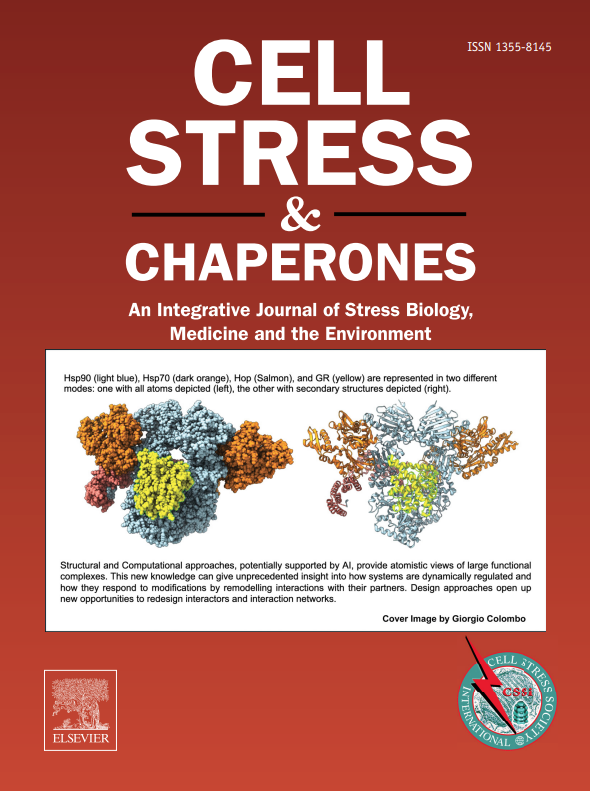淀粉样蛋白形成促进HSF1活性,增强乳腺癌转移定殖过程中的细胞存活。
IF 3.2
3区 生物学
Q3 CELL BIOLOGY
引用次数: 0
摘要
乳腺癌是妇女中最常见的癌症,也是妇女癌症死亡的第二大原因。大多数乳腺癌死亡是由于转移,当原发肿瘤细胞侵入血流并迁移到远处的器官部位时就会发生转移。转移定殖是转移的限速步骤。热休克因子1 (HSF1)是一种转录因子,由于其促进上皮-间质转化(EMT)的作用,已被证明参与促进恶性肿瘤的转移传播。HSF1在定植中的作用尚不清楚。在这项研究中,我们观察到HSF1在转移性定植中是必不可少的。与这些发现一致,我们还观察到HSF1在人类转移性肿瘤中比原发肿瘤更活跃。HSF1在体外集落形成过程中也被激活,这伴随着淀粉样蛋白(Aβ)原纤维的增加,这在人类转移性肿瘤中也被观察到。β原纤维导致HSF1激活,而HSF1的消耗或抑制导致β原纤维的增加。用小分子抑制剂抑制HSF1抑制转移性乳腺癌细胞体外集落形成和乳腺球生长。这些结果表明,定殖增加了a β纤维的形成,随后激活HSF1,这是转移起始和生长所必需的细胞存活机制。本文章由计算机程序翻译,如有差异,请以英文原文为准。
Amyloidogenesis promotes HSF1 activity enhancing cell survival during breast cancer metastatic colonization
Breast cancer is the most commonly diagnosed cancer among women and the second leading cause of cancer deaths in women. A majority of these breast cancer deaths are due to metastasis, which occurs when primary tumor cells invade into the blood stream to travel and colonize at distant organ sites. Metastatic colonization is the rate-limiting step of metastasis. Heat shock factor 1 (HSF1) is a transcription factor that has been shown to be involved in promoting malignancy with a function in metastatic dissemination due to its contribution to promoting epithelial-to-mesenchymal transition. The role of HSF1 in colonization is unclear. In this study, we observed that HSF1 was essential for metastatic colonization. Consistent with these findings, we also observed that HSF1 was more active in human metastatic tumors compared to primary tumors. HSF1 was also seen to be activated during in vitro colony formation, which was accompanied by increases in amyloid beta (Aβ) fibrils, which was also observed in human metastatic tumors. Aβ fibrils led to HSF1 activation and depletion or inhibition of HSF1 led to increases in Aβ fibrils. HSF1 inhibition with small molecule inhibitors suppressed in vitro colony formation and mammosphere growth of metastatic breast cancer cells. These results suggest that colonization increases Aβ fibril formation that subsequently activates HSF1 as a cell survival mechanism that is essential for metastatic initiation and outgrowth.
求助全文
通过发布文献求助,成功后即可免费获取论文全文。
去求助
来源期刊

Cell Stress & Chaperones
生物-细胞生物学
CiteScore
7.60
自引率
2.60%
发文量
59
审稿时长
6-12 weeks
期刊介绍:
Cell Stress and Chaperones is an integrative journal that bridges the gap between laboratory model systems and natural populations. The journal captures the eclectic spirit of the cellular stress response field in a single, concentrated source of current information. Major emphasis is placed on the effects of climate change on individual species in the natural environment and their capacity to adapt. This emphasis expands our focus on stress biology and medicine by linking climate change effects to research on cellular stress responses of animals, micro-organisms and plants.
 求助内容:
求助内容: 应助结果提醒方式:
应助结果提醒方式:


